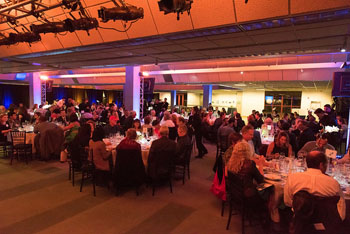Campus News
Founders Celebration 2016 celebrates excellence, generosity, vision
Hundreds of revelers turned UC Santa Cruz’s Science & Engineering Library into a “collision space” of ideas during the 11th annual Founders Celebration, a time to celebrate excellence and generosity.




Hundreds of revelers turned UC Santa Cruz’s Science & Engineering Library into a “collision space” of ideas during the 11th annual Founders Celebration, a time to celebrate excellence and generosity.
The library is now undergoing a renovation, which is gradually transforming the building into a more vital and interactive space.
That vitality was very much in evidence during the celebration. Artful lighting in shades of red and blue, a dynamic troop of dancers, and strings of lights in the courtyard, transformed the library into a lively and thoughtful party space.
During her spirited and funny remarks to the crowd, Alumni Achievement Award honoree Julie Snyder (Kresge ’95, politics), co-creator of the massively popular Serial podcast, made a confession: “In a bajillion years, I never could have pictured myself being the person who is up here on stage tonight because that is not how I saw myself when I was here: I was not a go-getter!”
Snyder, whose podcast unspools gripping true-life stories, is considered a journalistic pioneer. She, along with her co-creator Sarah Koenig, has found a way to blend riveting storytelling with hard-nosed reporting.
In that sense, Snyder is part of a longstanding tradition of journalists whose work is exhaustively researched but is every bit as engaging as great fiction. Snyder name-dropped fellow UC Santa Cruz grads Nikki Silva (Porter ’73, aesthetic studies) and Lawrence Weschler (Cowell ’74, philosophy and western civilization) and an amazing list of Pulitzer Prize winners who are fellow Banana Slugs: Hector Tobar (Oakes ’85, Latin American studies/sociology), Dana Priest Merrill (’81, politics), Martha Mendoza (Kresge ’88, journalism and education), and William Finnegan (Cowell, ’74, English literature).
Considering that Snyder can now take her place among the most distinguished journalists who have graduated from UC Santa Cruz, it is humbling to realize that she wasn’t particularly “single-minded or ambitious” when she first arrived on campus.
On the upside, she found herself challenged all the time. Her takeaway from UC Santa Cruz was this: “Be fearless, be progressive, challenge the orthodoxy, question the status quo, and don’t just follow what others do and have always done. Truly listen to one another. Follow a new path.”
The spirit of UC Santa Cruz followed her as she launched her broadcasting career at This American Life. That same spirit helped guide her hand two years ago when she started Serial with Koenig.
Little did Snyder know that Serial, shortly after its debut, would reach 5 million downloads—the fastest podcast download rate in iTunes history—or that the show would approach a total of 253 million downloads after the first two seasons, drawing listeners from every country in the world except North Korean and Eritrea. “I don’t know what Eritrea’s problem is!” Snyder joked.
Snyder did her best to explain Serial’s massive popularity. She believes that “the part of the brain that reacted to shows like House of Cards and Breaking Bad lit up when listening to Serial, but this wasn’t entertainment, it was journalism. It was real, and people weren’t used to responding to journalism that way. And the question became, ‘What is this? This must be something new, and is this OK to do with a nonfiction story? Is it too entertaining? Is this responsible?’ I would say artistry is OK in reporting as long as you’re sticking to the truth.”
Emotional addresses
Another emotional high point was the awarding of the Faculty Research Award to UC Santa Cruz linguistics professor Sandra Chung, who was recognized for her work focusing on 1,200 related languages spoken on Pacific island archipelagos—especially Chamorro, an understudied language of the Mariana Islands. She said the award really belonged to the speakers of the Pacific languages. She also acknowledged her late father, Harold Chung, who she described as a “college drop-out from a different University of California campus” who started out as a lab assistant. “I hope some part of his spirit of scientific inquiry continues in my research,” she said. “He would have been delighted to be here tonight.”
During the evening, the Helen and Will Webster Foundation was honored with the Fiat Lux Award. Claudia and Alec Webster (Rachel Carson College ’02, environmental studies) help steward the foundation. They accepted the award on behalf of the foundation.
The Websters are well-known on campus for their generosity and vision. Their philanthropy named and endowed the newly rededicated Rachel Carson College (formerly College Eight), and established five endowed chairs.
The Websters are also known for their intervention to save the Cowell Ranch Hay Barn, which was on the verge of collapse before they funded an ambitious rebuilding project. The barn is now a center for UC Santa Cruz’s environmental and sustainability programs, home to the Center for Agroecology and Sustainable Food Systems, and a campus and community hub.
Claudia Webster said that Helen and Will Webster have been “incredibly brave” in their vision for UC Santa Cruz. “In doing so, they have opened the world to us beyond anything I would have ever aspired to. It brings me to you.”
Directing her remarks to the UC Santa Cruz community, Webster continued: “I truly believe you don’t understand how important you are, how much goodness you bring to the world, the work you do that is so needed. I asked (University Librarian Elizabeth Cowell), ‘Can you even wrap your mind around the talent and brains that are in the room tonight? I could start naming names but we’d be here all evening.”
Claudia Webster said that a foundation could give money to any number of good causes, “and we have tried, but we keep coming back to UC Santa Cruz and the Santa Cruz community. You are the best of the best. Don’t lose sight of how important you are.”